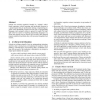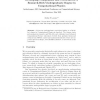251 search results - page 7 / 51 » Computational Physics Education; why, what and how |
131
click to vote
ACSE
2000
ACM
15 years 6 months ago
2000
ACM
Computer Science Education Research is often done in a very local setting and findings are difficult to transfer to other institutions. There are however several factors that spea...
108
Voted
SIGPLAN
2008
15 years 1 months ago
2008
Liberal arts curricula emphasize breadth of a student's educational experience, critical reasoning, and intellectual discourse to a greater degree than pre-professional train...
129
Voted
CHI
2005
ACM
16 years 2 months ago
2005
ACM
From pre-schools to high schools, at home and in museums, the educational community has embraced the use of computers as a teaching tool. Yet many institutions will simply install...
127
click to vote
CE
2004
15 years 1 months ago
2004
Much computer-based learning is largely passive, based primarily on task-based, exercise-driven interactions. We argue that computers have greater potential for promoting more act...
184
click to vote
ICCS
2001
Springer
15 years 6 months ago
2001
Springer
Abstract. A four-year undergraduate curriculum leading to a Bachelor’s degree in Computational Physics is described. The courses, texts, and seminars are research- and Web-rich, ...



